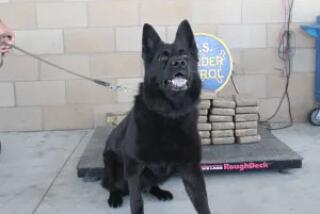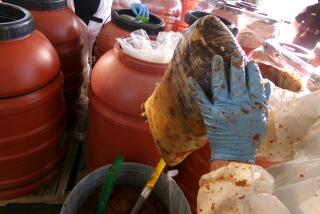U.S. Customs Service Is Looking for a Few Good Dogs With a Nose for Illegal Drugs
- Share via
For the dogs, it means daylong games of hide-and-seek. For people sneaking drugs across the border, it may mean big trouble.
The U. S. Customs office at San Ysidro announced Thursday that it is looking to recruit 20 dogs this weekend for its Canine Enforcement Program, a unit that detects narcotics being smuggled across the border. The dogs now in the program demonstrated Thursday the qualities officers will be seeking.
Ed Lynch, district canine supervisor, emphasized that the dogs are not used for enforcement, so they are not seeking vicious animals. “They are used strictly for narcotics detection,” he said. “We want dogs who are at least 1 year old because, if they are less than 1 year, they are too playful; they’re like little kids, and they don’t concentrate as long.”
Sammy, a year-old golden retriever, seemed playfully unaware of the significance of the search as he romped around a demonstration car. His handler, Nino Pamaran, egged Sammy on with encouraging words and affectionate, energetic roughhousing.
Sammy indicated to Pamaran that he had found the drugs when he began scratching the metal just above one of the car’s tires. Officers reached in and pulled out a 2-pound bag of marijuana.
“The idea is to get them to track the odor to its source. A small odor is obviously hard to detect, but it has worked on just a few seeds (of marijuana),” Lynch said. The dog scratches or bites the area when it smells drugs, to alert the officer.
The dogs have never given a false alert, Lynch claimed. “Sometimes, when drugs are removed, a residual odor stays in the place, and the dogs will give an alert. They aren’t wrong, drugs were there, at one time.”
It takes a close relationship between dog and handler before the officer can discern the animal’s responses, said Pamaran, who has been working with Sammy for seven months.
“When they find something, you’ll know. It’s that abnormal behavior that lets you know, and you learn how to read that behavior when they pair you up at the training school,” Pamaran said. “They match up your personality, because, if the dog doesn’t like you, he’s not going to work for you. He said Sammy loves him. “He’d do anything for me.”
Lynch agreed: “It’s definitely a team effort.”
U. S. Customs stations across the country have 163 detector dogs working at international airports, seaports and along the southern border, Lynch said. He would not divulge the number in the program that has been operating at San Ysidro for 19 years, but “we’re expanding,” he said. Most of the dogs come from animal shelters, where officers are able to screen about 100 at a time.
Lynch will be recruiting at Southwestern College in Chula Vista from 9 a.m. to 5 p.m. on Saturday and Sunday. He is seeking 20 dogs that have a “willingness to retrieve,” and will pay owners up to $250 for dogs who successfully complete the 17-week training. During motivational training, the dogs learn how to sniff out the four basic drugs, marijuana, hashish, cocaine and heroin, and are paired with Customs officers. Each officer is assigned two dogs, in case one fails the program, Lynch said.
More to Read
Sign up for Essential California
The most important California stories and recommendations in your inbox every morning.
You may occasionally receive promotional content from the Los Angeles Times.










